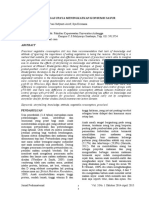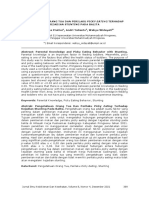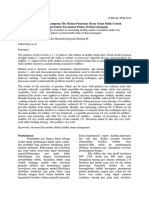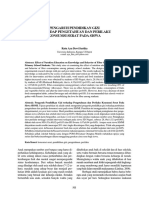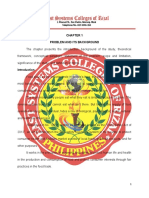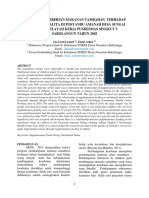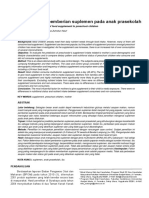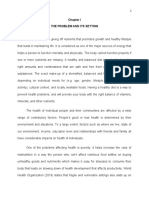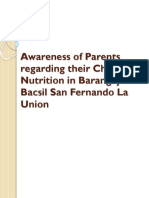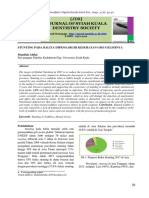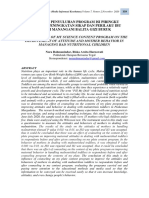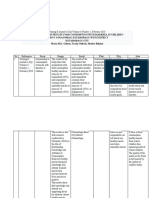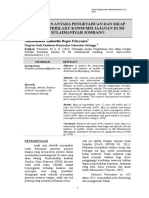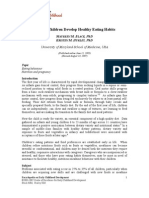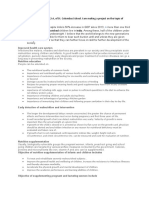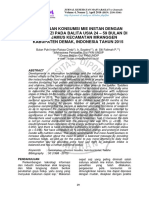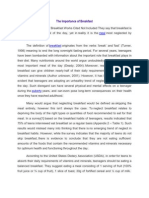Storytelling Sebagai Upaya Meningkatkan Konsumsi Sayur: Pendahuluan
Storytelling Sebagai Upaya Meningkatkan Konsumsi Sayur: Pendahuluan
Uploaded by
ganang wahyu kurniadiCopyright:
Available Formats
Storytelling Sebagai Upaya Meningkatkan Konsumsi Sayur: Pendahuluan
Storytelling Sebagai Upaya Meningkatkan Konsumsi Sayur: Pendahuluan
Uploaded by
ganang wahyu kurniadiOriginal Title
Copyright
Available Formats
Share this document
Did you find this document useful?
Is this content inappropriate?
Copyright:
Available Formats
Storytelling Sebagai Upaya Meningkatkan Konsumsi Sayur: Pendahuluan
Storytelling Sebagai Upaya Meningkatkan Konsumsi Sayur: Pendahuluan
Uploaded by
ganang wahyu kurniadiCopyright:
Available Formats
STORYTELLING SEBAGAI UPAYA MENINGKATKAN KONSUMSI SAYUR
Nor Za’idah Asy’ariyah, Yuni Sufyanti Arief, Ilya Krisnana
Korespondensi:
Nor Za’idah Asy’ariyah, d/a: Fakultas Keperawatan Universitas Airlangga
Kampus C Jl Mulyorejo Surabaya, Telp. 031 5913754
E-mail: zaidah.binti@gmail.com
ABSTRACT
Preschool vegetable consumption still less than recommendation that lack of knowledge and
attitude of ignoring the importance of eating vegetables is being the reasons. Storytelling is a
method that suitable for cognitive and affective development of preschool which able to imagine
new perspectives and invite learning experiences from the characters. The purpose of this study
was to examine the effects of storytelling on knowledge and attitude vegetable consumption for
preschool at Nitasari Kindergarten Mojo Gubeng Surabaya. A Quasy Experiment method with
pretest-posttest control group design was used. The populations were students of Nitasari
Kindergarten Surabaya in the B class which has 37 students. Samples were taken by purposive
sampling technique. The independent variable is storytelling with flash card as a media, while the
dependent variable is the knowledge and attitude of preschool in vegetable consumption. Data
were collected by using questionnaire and interview then analyzed using level of significance
p<0.05 by Wilcoxon Sign Rank Test and Mann Whitney U test. Result showed that there was
difference in vegetable consumption knowledge level between treatment and control groups with
p=0.000; and there was difference in vegetable consumption attitude between treatment and
control groups with p=0.003. It can be concluded that storytelling has effect on knowledge and
attitude vegetable consumption for preschool. Storytelling should carry out by competence
storyteller and for further studies should examine into action domain.
Keywords: storytelling, knowledge, attitude, vegetable consumption, preschool
PENDAHULUAN kalsium, yang zat-zat penting tersebut
sebagian besar didapat dari konsumsi sayur
Usia prasekolah (3–6 tahun) merupakan masa
setiap hari.
perkembangan sosial, intelektual dan
emosional yang pesat bagi anak. Anak
Anak masih sangat bergantung pada orang
membutuhkan asupan gizi yang adekuat untuk
dewasa, terutama orang tua yang berperan
mencapai pertumbuhan dan perkembangan
penting pada pembentukan pola makan dan
yang optimal. Oleh sebab itu nutrisi memiliki
pemenuhan kebutuhan nutrisi termasuk
peranan penting bagi tumbuh kembangnya,
memilihkan jenis makanan yang
dimana nutrisi didapatkan dari makanan yang
dihidangkan. Jenis makanan keluarga
dikonsumsi tiap hari. Pertumbuhan yang cepat
pertama yang dikenalkan adalah sop sayur
saat masa infant berangsur-angsur melambat
(52,7%) dan tahu/tempe (29,0%) (Harinda,
saat anak memasuki usia prasekolah. Seiring
2012). Hal ini membuktikan orang tua
dengan penurunan kecepatan pertumbuhan ini,
sebagai penyedia makanan dan yang
perilaku makan menjadi berubah. Hal ini
mengenalkan berbagai macam makanan
membuat anak mengalami penurunan nafsu
termasuk sayur sudah memperkenalkan
makan dan hanya mau makan makanan yang
sejak dini, namun anak memilih-milih dan
disukai (Wardlaw & Smith, 2009). Anak
menghindari sayur. Dari hasil wawancara
cenderung tidak mau makan sayur, padahal
yang dilakukan pada 7 orang ibu siswa TK
intake protein, kalsium, zat besi, vitamin A dan
B Nitasari, 100% ibu selalu menghidangkan
D yang adekuat merupakan hal penting selama
menu sayur setiap hari. Akan tetapi, 6 dari 7
masa ini (British Nutrition Foundation, 2009).
ibu mengatakan bahwa anak menolak untuk
Anak membutuhkan asupan tinggi protein,
makan sayur. Anak lebih memilih nasi dan
rendah lemak, tinggi vitamin B dan tinggi
lauk saja seperti telur, ikan dan ayam. Ibu
Jurnal Pediomaternal 7 Vol. 3 No. 1 Oktober 2014-April 2015
3
harus berusaha keras dan memaksa anak untuk Ketika dihidangkan mie goreng yang
mau makan sayur sehingga membuat suasana terdapat sawi hijau didalamnya, para siswa
makan tidak nyaman dan anak menjadi rewel. cenderung memilih mie saja dan
Gambaran sikap ini merupakan kasus global menyisahkan sawi hijau lalu dibuang.
dan merupakan suatu kesulitan bagi orangtua
untuk memberi anak-anak mereka makanan Salah satu penyebab rendahnya konsumsi
yang mengandung serat dan banyak vitamin sayur pada anak karena kurangnya
yaitu sayur-mayur (Wardlaw & Smith 2009). pengetahuan dan sikap mengabaikan
Anak perlu mendapat penanaman sejak dini pentingnya makan sayur. Tidak efektifnya
mengenai pentingnya makan sayur, karena pendidikan gizi pada anak semenjak usia
masa prasekolah merupakan waktu yang dini berdampak pada pengetahuan yang
terbaik untuk inisiasi eating behaviors yang kurang tentang pola konsumsi makanan
baik dan akan bertahan hingga dewasa (Droog yang sehat dan seimbang saat dewasa,
et al., 2013). Dongeng bisa menjadi wahana sehingga menyebabkan perilaku yang salah
untuk mengasah imajinasi, membuka (Kementerian Kesehatan RI, 2011). Masalah
pemahaman dan belajar pada pengelaman- tersebut dapat berakibat buruk bagi tumbuh
pengalaman sang tokoh dalam dongeng kembang anak. Anak dapat mempunyai
tersebut. Teknik bercerita merupakan cara peluang besar untuk menderita kurang gizi
yang unik, menarik tanpa memaksa dan tanpa karena makanan yang dikonsumsi dalam
perlu menggurui sang anak (Haryani, 2007). jumlah sedikit sehingga tidak memenuhi
kebutuhan nutrisinya (Fitriani et al., 2009).
Terdapat proporsi yang cukup besar pada anak Selain itu, anak dapat mengalami stunting
di dunia yang tidak memenuhi rekomendasi atau menjadi balita pendek. Berdasarkan
WHO dalam konsumsi sayur dan buah, yakni Riset Kesehatan Dasar tahun 2010,
setidaknya 400 gram/hari (Krolner et al., Indonesia dengan prevalensi anak balita
2011). Hal ini disebabkan karena anak sudah pendek sebesar 35,6% merupakan negara
dapat memilih-milih makanan yang ke-5 terbesar yang berkontribusi pada 90%
disukainya, hanya mau makan makanan stunting di dunia. Anak pendek mempunyai
tertentu saja dan cenderung menghindari risiko lebih tinggi menderita diabetes,
makan sayur (Fitriani et al., 2009). obesitas, hipertensi dan stroke pada usia
Diperkirakan sebanyak 80% anak-anak di dewasa (Kementerian Kesehatan RI, 2011).
dunia ini yang tidak menyukai sayur-mayur Untuk itu, diperlukan suatu metode untuk
sedangkan sayur-mayur merupakan meningkatkan pengetahuan dan sikap
penyumbang utama untuk nutrisi dan diet mengenai pentingnya makan sayur setiap
seimbang pada anak-anak dan dewasa hari. Oleh sebab itu, perlulah dilakukan
(Maryam, 2012). Sebuah penelitian oleh The intervensi sejak dini supaya anak-anak
Gateshead Millenium Baby Study pada tahun mendapat kesehatan yang optimum
2006 di Inggris menyebutkan 20% orangtua (Wardlaw et al., 2004). Storytelling
melaporkan anaknya mengalami masalah merupakan metode yang sesuai dengan
makan, dengan prevalensi tertinggi anak hanya perkembangan kognitif dan afektif anak
mau makan makanan tertentu (Wright, 2007). usia prasekolah.
Survei lain di Amerika Serikat menyebutkan
19-50% orangtua mengeluhkan anaknya Saat storytelling berlangsung merupakan
sangat pemilih dalam makan sehingga terjadi proses yang penting, terjadi penyerapan
defisiensi zat gizi tertentu (Piazza & pengetahuan yang disampaikan storyteller
Hernandez, 2004). Gunanti (2000) dalam kepada audience. Proses inilah yang
penelitiannya mengatakan rata-rata konsumsi menjadi pengalaman seorang anak dan
sayur pada anak prasekolah masih kurang dari menjadi tugas storyteller untuk
anjuran, yaitu 50,9 gram/kapita/hari. Padahal menampilkan kesan menyenangkan pada
angka anjuran konsumsi anak prasekolah saat bercerita (Kusumastuti, 2010). Setelah
adalah >75 gram/kapita/hari. Hasil itu, memilah mana yang dapat dijadikan
pengambilan data awal, dari 40 siswa TK B panutan sehingga membentuknya menjadi
Nitasari, >50% siswa menyisihkan sayur yang moralitas yang dipegang sampai dewasa
dihidangkan saat makan bersama. Para siswa (Haryani, 2007). Anak akan mengadopsi
lebih memilih nasi dan lauk daripada sayur. cerita yang disampaikan oleh storyteller
Jurnal Pediomaternal 7 Vol. 3 No. 1 Oktober 2014-April 2015
4
yang berisi tentang pesan-pesan baik; senang memiliki skor rendah. Sama halnya dengan
makan sayur, tidak rewel dan memilih-milih kelompok perlakuan, tingkat pengetahuan
jenis makanan saat waktu makan tiba. konsumsi sayur kelompok kontrol saat
Selanjutnya, anak diharapkan dapat pretest sebagian besar pada tingkat rendah
menerapkan pesan-pesan yang disampaikan yaitu terdapat 11 responden (68,75%)
pada kehidupan sehari-hari. Storytelling memiliki pengetahuan rendah tentang
merupakan cara yang efektif untuk konsumsi sayur.
mengembangkan aspek kognitif, afektif dan
aspek konatif anak (Asfandiyar, 2007). Tabel 1 Pengetahuan konsumsi sayur sebelum
Berdasarkan uraian diatas, maka perlu dan sesudah diberikan storytelling
dilakukan penelitian guna mempelajari Perlakuan Kontrol
pengaruh storytelling terhadap pengetahuan Tingkat Pre Post Pre Post
dan sikap anak usia prasekolah dalam pengeta
huan n % n % n % n %
konsumsi sayur di TK Nitasari Mojo Gubeng
Surabaya. Rendah 12 75 2 12,5 11 68,75 10 62,5
Cukup 3 18,75 3 18,75 5 31,25 5 31,25
BAHAN DAN METODE Baik 1 6,25 11 68,75 0 0 1 6,25
Desain pada penelitian adalah Quasy Total 16 100 16 100 16 100 16 100
Experimental dengan rancangan Pretest- Wilcoxon Signed
P=0,000 P=0,070
Posttest Control Group Design, dengan Rank Test
Mann-Whitney U
populasi dalam penelitian adalah siswa-siswi Test
P=0,000
TK B Nitasari Kelurahan Mojo Kecamatan
Gubeng Surabaya yang berjumlah 37 anak. Saat dilakukan posttest menunjukkan bahwa
Pendekatan sampling yang digunakan dalam hampir seluruh responden pada kelompok
penelitian ini adalah purposive sampling. perlakuan memiliki pengetahuan konsumsi
Berdasarkan kriteria inklusi dan eksklusi yang sayur pada tingkat pengetahuan baik setelah
telah ditetapkan, didapatkan besar sampel diberikan storytelling, hal ini dibuktikan
sebanyak 32 anak. dengan adanya 11 reponden (68,75%) yang
memiliki skor baik. Pada kelompok kontrol
Variabel independen penelitian adalah saat posttest sebagian besar memiliki
storytelling dengan menggunakan media flash pengetahuan pada tingkat rendah yang
card. Variabel dependen dalam penelitian ini ditandai dengan 10 responden (62,50%)
adalah pengetahuan dan sikap konsumsi sayur yang memiliki pengetahuan yang rendah.
anak usia prasekolah. Instrumen yang
digunakan adalah kuisioner dan wawancara Hasil uji statistik Wilcoxon Signed Rank
terstruktur modifikasi dari Hariani (2011). Test diperoleh nilai p=0,000 sehingga
Data yang diperoleh dianalisis menggunakan p<0,05 artinya ada perbedaan pengetahuan
Wilcoxon signed rank test dan Mann Whitney yang signifikan saat pretest dan posttest
Test dengan derajat kemaknaan p ≤ 0,05. pada kelompok perlakuan. Pada kelompok
kontrol didapatkan hasil uji statistik
HASIL PENELITIAN Wilcoxon Signed Rank Test diperoleh nilai
Penelitian dilakukan di Taman Kanak-Kanak p=0,070 sehingga p>0,05 yang artinya tidak
Nitasari yang terletak di Jalan Jojoran III/168 ada perbedaan pengetahuan yang signifikan
Kelurahan Mojo Kecamatan Gubeng saat pretest dan posttest. Hasil uji statistik
Surabaya. Kegiatan pembelajaran terkait Mann-Whitney U Test diperoleh p=0,000
konsumsi sayur yang dilakukan di TK Nitasari sehingga p<0,05 yang artinya ada perbedaan
antara lain makan bersama satu bulan sekali pengetahuan yang signifikan antara
yang didalamnya terdapat menu sayur-mayur. kelompok perlakuan dan kontrol.
Tabel 1 menunjukkan bahwa hampir seluruh Berdasarkan tabel 2 sikap siswa pada
responden pada kelompok perlakuan memiliki kelompok perlakuan saat pretest memiliki
pengetahuan yang rendah tentang pengetahuan perbandingan sikap positif dan sikap negatif
konsumsi sayur pada saat pretest dilakukan yang sama. Hal ini dapat ditunjukkan dari
yang dibuktikan dengan 12 responden (75%) jumlah respoden yang memiliki sikap positif
Jurnal Pediomaternal 7 Vol. 3 No. 1 Oktober 2014-April 2015
5
terhadap konsumsi sayur sebanyak 8 rendah. Pada tabulasi nilai pengetahuan saat
responden (50%) dan memiliki sifat negatif pretest, responden pada kelompok perlakuan
sebanyak 8 responden (50%). Sebagian besar memiliki pengetahuan yang rendah pada
responden kelompok kontrol bersikap positif beberapa aspek pengetahuan mengenai
dalam konsumsi sayur yang dibuktikan dengan konsumsi sayur yaitu macam-macam sayur
9 responden (56,25%) memiliki sikap positif dan frekuensi makan sayur. Sebagian besar
saat dilakukan pretest. responden tidak lulus pada parameter
macam-macam sayur, frekuensi makan
Tabel 2 Sikap konsumsi sayur sebelum dan sesudah sayur dan manfaat makan sayur. Setelah
diberikan storytelling dilakukan analisis, diketahui bahwa
responden belum pernah mendapatkan
Perlakuan Kontrol pendidikan kesehatan mengenai konsumsi
Kategori Pre Post Pre Post sayur. Kegiatan pembelajaran terkait hal
sikap n % n % n % n % tersebut jarang dilakukan. Para pengajar
menjelaskan kepada siswa-siswi bahwa
Positif 8 50 11 68,75 9 56,25 8 50
sayur itu membuat tubuh sehat namun tidak
Negatif 8 50 5 31,25 7 43,75 8 50 menyampaikan manfaat lainnya. Mengenai
10 jenis-jenis sayur dan dampak kurang
Total 16 100 16 100 16 100 16
0
Wilcoxon Signed konsumsi sayur, hanya menyampaikan
Rank Test
P=0,005 P=0,088 secara garis besar atau secara umum. Siswa-
Mann-Whitney U siswi hanya mengetahui bahwa semua
Test
P=0,003
gambar sayur bernama sayur, tanpa
mengetahui nama masing-masing sayur.
Sebagian besar responden kelompok perlakuan Kristjandottir et al. (2006) dalam
memiliki sikap positif dalam konsumsi sayur Fibrihirzani (2012) mengatakan bahwa
setelah diberikan intervensi storytelling yang pengetahuan tentang manfaat dan anjuran
dibuktikan dengan 11 reponden (68,75%) konsumsi sayur berbanding lurus dengan
memiliki sikap positif sesuai tabel 2. Sikap konsumsi sayur pada anak. Hal ini sangat
siswa pada kelompok kontrol saat posttest berhubungan dengan pola orang tua dalam
memiliki perbandingan sikap positif dan sikap mengajarkan anaknya mengenai konsumsi
negatif yang sama. Hal ini dapat ditunjukkan sayur serta peran guru/pengajar dalam
dari jumlah respoden yang memiliki sikap mengenalkan dan mendidik siswa-siswinya
positif terhadap konsumsi sayur sebanyak 8 dalam hal pengetahuan konsumsi sayur
responden (50%) dan memiliki sifat negatif sejak usia kanak-kanak.
sebanyak 8 responden (50%).
Responden yang memiliki pengetahuan
Hasil uji statistik Wilcoxon Signed Rank Test konsumsi sayur kategori baik berjumlah 1
diperoleh nilai p=0,005 sehingga p<0,05 yang anak pada pretest. Responden tersebut
berarti ada perbedaan sikap yang signifikan pernah mendapatkan pendidikan play group
saat pretest dan posttest pada kelompok dan pendidikan terakhir orang tua responden
perlakuan. Pada kelompok kontrol, hasil uji adalah Diploma. Sedangkan pengetahuan
statistik Wilcoxon Signed Rank Test terburuk ada pada 1 responden yang
menunjukkan nilai signifikansi p=0,088 memiliki tingkat pengetahuan rendah
sehingga p<0,05 yang artinya tidak ada dimana anak tersebut hanya menjawab 1
perbedaan sikap yang signifikan saat pretest jawaban benar. Responden tersebut tidak
dan posttest. Hasil uji statistik Mann-Whitney pernah mendapatkan pendidikan play group
U Test menunjukkan bahwa hasil signifikansi dan pendidikan terakhir kedua orang tua
p=0,003 sehingga p<0,05 yang berarti ada responden adalah Sekolah Dasar.
perbedaan sikap yang signifikan antara Pendidikan sangat mempengaruhi proses
kelompok perlakuan dan kontrol. belajar, baik pendidikan orang tua maupun
pendidikan anak tersebut. Dengan
PEMBAHASAN pendidikan yang tinggi maka seseorang
Berdasarkan tabel 1 pengetahuan responden akan cenderung untuk mendapatkan
pada kelompok perlakuan saat pretest informasi. Sebaliknya tingkat pendidikan
didapatkan hasil sebagian besar pada kategori yang kurang akan menghambat
Jurnal Pediomaternal 7 Vol. 3 No. 1 Oktober 2014-April 2015
6
perkembangan dan sikap seseorang terhadap menyentuh sesuatu yang memberikan
nilai-nilai yang baru diperkenalkan (Herlina, informasi tertentu agar ia bisa
2009). Responden yang pernah mendapatkan mengingatnya.
pendidikan playgroup, tingkat pengetahuannya
lebih baik dari pada responden yang tidak Pengetahuan pada seluruh responden
pernah mendapatkan pendidikan playgroup kelompok perlakuan mengalami
karena memungkinkan anak mendapatkan peningkatan setelah intervensi storytelling,
informasi dan pembelajaran yang lebih dari peningkatan terbesar adalah pada parameter
pada anak yang tidak pernah mendapatkan macam-macam sayur. Sebagian besar
pendidikan playgroup. Selain itu, pendidikan responden perlakuan memiliki pengetahuan
orang tua juga berpengaruh dalam hal ini. baik pada saat posttest. Macam-macam
Tidak dapat dipungkiri bahwa makin tinggi sayur bisa ditunjukkan melalui alat peraga
pendidikan seseorang semakin mudah pula yang digunakan dalam penelitian ini,
mereka menerima informasi dan makin banyak peneliti menggunakan media flash card.
pula pengetahuan yang dimilikinya. Flash card adalah salah satu alat peraga
Sebaliknya, jika seseorang tingkat dalam storytelling dimana alat peraga
pendidikannya rendah, akan menghambat digunakan untuk menarik minat anak-anak
perkembangan sikap seseorang terhadap dalam proses storytelling (Asfandiyar,
penerimaan, informasi dan nilai-nilai yang 2007). Manipulasi simbol merupakan
baru diperkenalkan (Mubarak, 2007). Akan karakteristik esensial dari tahapan anak
tetapi, pada penelitian ini tidak semua prasekolah. Kemampuan anak berada pada
responden sesuai dengan teori tersebut karena kemampuan menggunakan gambar simbolik
banyak faktor yang mempengaruhi tingkat dalam berfikir (Syaodih, 2011). Selain itu,
pengetahuan seseorang diantaranya anak mendapat visualisasi yang jelas dan
pendidikan, umur, lingkungan, pengalaman, nyata dari gambar-gambar yang ditunjukkan
minat, kebudayaan, dan sumber informasi. melalui media flash card, dalam hal ini
storytelling mampu menyajikan informasi
Hasil posttest pada kelompok perlakuan dan pesan melalui suara dan gambar (audio
didapat pengetahuan responden hampir dan visual) sehingga memudahkan anak
seluruhnya berada pada kategori baik. dalam memahami isi cerita.
Pengetahuan tertinggi ada pada parameter
pertama dan kedua yaitu macam-macam sayur. Sebagian besar responden kelompok kontrol
Peningkatan pengetahuan dari hasil pretest dan memiliki pengetahuan rendah saat pretest
posttest dapat diketahui melalui peningkatan maupun posttest. Kategori pengetahuan
kategori yang terjadi pada hampir seluruh pada kelompok kontrol saat pretest
responden. Perubahan yang sangat signifikan didapatkan hasil hampir seluruh responden
yaitu peningkatan pengetahuan responden dari pada kategori pengetahuan rendah. Pada
kategori rendah menjadi baik pada sebagian hasil posttest pengetahuan kelompok kontrol
besar responden (68,75%). Akan tetapi didapat pengetahuan responden sebagian
ditemukan 2 orang responden yang tetap besar tetap pada kategori rendah. Akan
berada pada kategori pengetahuan rendah. tetapi, ditemukan 2 responden yang
Responden yang tetap berada kategori mengalami penurunan kategori yakni dari
pengetahuan rendah dapat dikaitkan dengan kategori cukup menjadi rendah. Selain
tipe atau gaya belajar anak. Dalam penurunan terdapat 3 responden yang
penyampaian materi storytelling, pendongeng mengalami peningkatan kategori dari
perlu mempertimbangkan jenis gaya belajar kategori rendah menjadi cukup, dan 1
anak. Menurut Gardner (2008), terdapat tiga kategori dari cukup menjadi baik. Hal
tipe belajar anak yaitu audio, visual dan tersebut dapat terjadi karena responden
kinestetik. Metode storytelling hanya mendapatkan informasi mengenai konsumsi
menyajikan informasi berupa suara (audio) sayur dari sumber lain seperti media
melalui ucapan storyteller dan gambar (visual) elektronik, teman sebaya, orang tua atau
melalui media flash card. Tidak semua anak lainnya, namun informasi tersebut masih
memiliki tipe belajar auditori dan/atau visual. belum mampu meningkatkan pengetahuan
Beberapa anak memiliki gaya belajar responden. Dari hasil tersebut, tidak
kinestetik dimana mengharuskan anak tersebut ditemukan perbedaan yang signifikan pada
Jurnal Pediomaternal 7 Vol. 3 No. 1 Oktober 2014-April 2015
7
aspek pengetahuan responden kelompok kebutuhan dan metode yang digunakan
kontrol antara pretest dan posttest. harus sesuai dengan karakteristik kelompok
yang akan menerima informasi tersebut.
Storytelling dengan media flash card Kelebihan metode storytelling adalah cerita
merupakan salah satu metode belajar yang tersebut bisa menjadi wahana untuk
cocok dan sesuai untuk anak usia prasekolah. mengasah imajinasi, membuka pemahaman
Pada saat proses storytelling berlangsung dan belajar pada pengalaman-pengalaman
terjadi sebuah penyerapan pengetahuan yang sang tokoh dalam dongeng tersebut. Teknik
disampaikan pencerita kepada audience. bercerita merupakan cara yang unik,
Proses inilah yang menjadi pengalaman menarik tanpa memaksa dan tanpa perlu
seorang anak (Kusumastuti, 2010). Setelah itu menggurui sang anak (Haryani, 2007).
memilah mana yang dapat dijadikan panutan Storytelling merupakan metode
olehnya sehingga membentuknya menjadi penyampaian informasi yang tepat bagi usia
moralitas yang dipegang sampai dewasa anak prasekolah. Hasil pretest dan postest
(Haryani, 2007). Anak mengadopsi cerita yang menunjukkan bahwa terdapat pengaruh
disampaikan oleh storyteller yang berisi yang signifikan antara storytelling terhadap
tentang pesan-pesan yang baik untuk senang pengetahuan konsumsi sayur kelompok
makan sayur, sehingga pengetahuan anak perlakuan, sedangkan pada kelompok
meningkat yang ditandai dengan kontrol hasilnya tidak signifikan.
meningkatnya skor pengetahuan responden ke
dalam kategori pengetahuan baik. Berdasarkan tabel 2 sikap responden
kelompok perlakuan saat pretest didapatkan
Kisah yang disampaikan saat storytelling pada hasil setengah dari seluruh responden
pertemuan pertama berisi cerita seorang siswa berada pada kategori negatif. Pada tabulasi
TK yang tidak bersemangat sekolah karena sikap saat pretest, responden kelompok
sakit perut, susah buang air besar akibat selalu perlakuan memiliki sikap negatif terbanyak
menolak dan tidak mau makan sayur. Salah pada pernyataan manfaat makan sayur
seorang teman dari siswa tersebut (parameter keenam) yakni 7 responden yang
menceritakan pengalaman kakaknya yang menjawab setuju (pernyataan negatif).
pernah merasakan hal yang sama. Sakit perut Setengah dari seluruh responden tidak lulus
itu tidak enak, tidak menyenangkan dan pada parameter manfaat makan sayur, hal
mengganggu bermain. Hal ini ditekankan ini disebabkan karena tingkat pengetahuan
untuk parameter dampak kurang konsumsi atau informasi yang dimiliki kurang. 6 dari
sayur. Selain itu, teman siswa tersebut 12 responden yang memiliki pengetahuan
menceritakan nasihat orang tuanya akan konsumsi sayur rendah, responden tersebut
pentingnya konsumsi sayur (penekanan juga mempunyai sikap negatif terhadap
parameter manfaat makan sayur). Di akhir konsumsi sayur. Pengetahuan tentang sayur
cerita siswa TK tersebut mau makan sayur, pada anak akan sangat mendukung sikap
menjadi anak yang sehat, bersemangat sekolah dan perilaku anak untuk mengkonsumsinya.
dan dapat bermain kembali bersama teman- Menurut Fibrihirzani (2012), ketika anak
teman. Cerita yang mengisahkan langsung tahu mengenai manfaat konsumsi sayur
tokoh anak seperti ini akan terkesan dekat dan anak akan sadar dan tertarik untuk mencoba
nyata karena responden bisa membayangkan mengonsumsinya. Pengenalan dan
langsung bahwa yang ada di dalam cerita pemaparan sayur secara berulang-ulang saat
tersebut adalah dirinya. Dengan demikian usia dini mampu meningkatkan kesukaan
reponden akan membayangkan sakit perut, anak. Hal ini sangat berhubungan dengan
susah buang air besar, tidak bisa belajar dan pola orang tua dalam mengajarkan dan
bermain karena tidak mau makan sayur, menanamkan kesukaan terhadap konsumsi
kemudian pada akhirnya anak tidak mau sayur, termasuk mengenal macam-macam
meniru dan tidak ingin merasakan pengalaman sayur dan manfaatnya bagi tubuh.
yang tidak menyenangkan tersebut. Responden yang dibiasakan oleh orang
Teknik dan metode penyampaian merupakan tuanya untuk mengkonsumsi sayur setiap
faktor penting yang menunjang keberhasilan hari akan cenderung menyukai dan bersikap
transfer informasi. Tujuan penyampaian positif dalam hal konsumsi sayur tersebut,
informasi harus menyesuaikan dengan maka hal ini akan tertanam dalam benak
Jurnal Pediomaternal 7 Vol. 3 No. 1 Oktober 2014-April 2015
8
anak bahwa sayur memiliki banyak macam bertahan pada kategori positif, serta terdapat
dan manfaat serta harus dikonsumsi setiap peningkatan pada 4 responden yang
hari. sebelumnya dalam kategori negatif menjadi
kategori positif. Akan tetapi, Storytelling
Pada pretest kelompok perlakuan ini, tidak memberikan perubahan sikap pada 4
ditemukan pula hasil bahwa responden responden yang tetap berada pada kategori
perempuan cenderung memiliki sikap positif negatif pada sebelum maupun sesudah
terhadap konsumsi sayur dibanding responden diberikan intervensi. Keempat responden
laki-laki. 5 dari 9 reponden perempuan tersebut tidak pernah mendapatkan
bersikap positif terhadap konsumsi sayur. pendidikan play group dan 2 dari 4
Sedangkan pada reponden laki-laki hanya 3 responden tersebut pendidikan terakhir
dari 7 reponden yang bersikap positif terhadap orang tua adalah Sekolah Dasar. Ditemukan
konsumsi sayur. Selain faktor pengetahuan, pula 1 orang responden yang mengalami
jenis kelamin merupakan salah satu faktor penurunan kategori dari positif menjadi
yang mempengaruhi konsumsi sayur pada negatif. Responden yang tidak dapat
anak. Perempuan mengonsumsi sayur lebih menjawab semua pertanyaan dengan benar
banyak dibandingkan laki-laki (Fibrihirzani, disebabkan karena posisi duduk reponden
2012). Hubungan antara jenis kelamin dengan saat storytelling jauh dari storyteller,
konsumsi sayur dapat disebabkan karena niat sehingga volume suara yang diterima antara
dan preferensi. Dalam penelitian Bere et al. responden satu dan yang lain tidak sama.
(2007), niat dan preferensi perempuan untuk Menurut Nasir (2009), lingkungan
mengonsumsi sayur dua kali lebih besar merupakan situasi yang dapat
daripada laki-laki. mempengaruhi proses komunikasi mulai
dari sumber yang menyampaikan pesan,
Responden yang bersikap positif terhadap sampai pada efek atau pengaruh pesan
konsumsi sayur berjumlah 8 anak saat pretest. terhadap penerima pesan. Menurut Majid
5 orang diantaranya memiliki orang tua (2001) dalam Kusumastuti (2010),
dengan pendidikan terakhir Diploma dan pendongeng harus memperhatikan posisi
Sekolah Menengah Atas. Tingkat pendidikan duduk agar kegiatan mendongeng berjalan
orang tua akan menentukan cara orang tua lancar dan mendapatkan hasil sesuai yang
dalam membimbing dan mengarahkan diharapkan. Saat penelitian berlangsung,
anaknya dalam hal pendidikan. Tingkat tidak dimungkinkan untuk mengkondisikan
pendidikan orang tua yang rendah akan tempat duduk audience di satu deret yang
cenderung sempit wawasannya terhadap sama untuk intervensi storytelling tersebut.
pendidikan, sedangkan tingkat pendidikan Pesan dan informasi yang disampaikan
orang tua yang tinggi akan memiliki wawasan mungkin tidak diserap sempurna oleh
yang lebih luas (Rini, 2012). Makin tinggi responden sehingga mempengaruhi hasil
pendidikan seseorang makin mudah orang posttest beberapa responden yang tetap
tersebut untuk menerima informasi. Semakin berada pada kategori sikap negatif.
banyak informasi yang masuk semakin banyak
pula pengetahuan yang didapat tentang Selain karena posisi duduk saat storytelling
kesehatan. Pengetahuan sangat erat berlangsung, terdapat hal lain yang dapat
hubungannya dengan pendidikan dimana mempengaruhi sikap beberapa responden
seseorang dengan pendidikan tinggi maka yang tetap pada kategori negatif. Mengubah
orang tersebut semakin luas pengetahuannya. aspek sikap seseorang tidak seperti
Namun perlu ditekankan bahwa seseorang mengubah aspek pengetahuan yang
berpendidikan rendah tidak berarti mutlak dibutuhkan beberapa waktu yang cukup
berpengetahuan rendah pula. Peningkatan lama. Menurut Azwar (2007), ada beberapa
pengetahuan tidak mutlak diperoleh dari faktor yang mempengaruhi pembentukan
pendidikan formal akan tetapi dapat diperoleh sikap seseorang antara lain pengalaman
dari pendidikan nonformal. pribadi, pengaruh orang lain yang dianggap
Peningkatan jumlah responden kelompok penting, kebudayaan, media massa, lembaga
perlakuan dengan kategori positif berdasarkan pendidikan, dan faktor emosional. Ada
data pada tabel 2, yaitu terdiri atas 7 responden kemunginan karena posttest dilakukan di
yang semula sudah dalam kategori positif tetap hari yang sama dengan intervensi,
Jurnal Pediomaternal 7 Vol. 3 No. 1 Oktober 2014-April 2015
9
responden membutuhkan waktu untuk berubah menyadari bahwa sayur-mayur sangat
dan mengolah informasi yang didapat bermanfaat bagi kesehatan.
sebelumnya sehingga masih ada beberapa
responden yang bersikap negative. saat Sebagian besar responden kelompok kontrol
dilakukan posttest. Semua responden yang memiliki sikap negatif saat pretest dan
bersikap negatif tersebut seluruhnya berusia 6 posttest. Kategori sikap pada responden
tahun. Ditinjau dari faktor emosional, kelompok kontrol saat pretest didapatkan
perkembangan emosional anak 6 tahun ada setengah dari seluruh responden berada
pada fase egosentris. Berpikir egosentris yaitu pada kategori negatif. Pada hasil posttest
berpikir tentang benar atau tidak benar, setuju sikap responden kelompok kontrol tidak
atau tidak setuju, berdasarkan sudut pandang jauh berbeda, sebagian besar responden
anak sendiri. Oleh sebab itu, anak belum dapat tetap pada kategori sikap negatif. Terdapat 4
meletakkan cara pandangnya di sudut pandang responden mengalami penurunan kategori
orang lain (Syaodih, 2011). dari positif menjadi negatif. Pada akhir total
tabulasi pada kelompok kontrol jumlah
Hasil posttest sikap responden kelompok responden yang berada pada kategori sikap
perlakuan sebagian besar berada pada kategori negatif meningkat. Hal ini dikarenakan
positif. Sikap positif terbanyak ada pada kelompok kontrol tidak mendapatkan
pernyataan mengenai kandungan sayur intervensi storytelling dimana terdapat
(parameter pertama) dan kesukaan makan pendidikan pengetahuan dan sikap dalam
sayur (parameter keempat) yaitu semua konsumsi sayur yang sesuai untuk anak usia
responden menjawab setuju (pernyataan prasekolah.
positif). Ditemukan peningkatan kategori
positif antara pretest dan posttest pada Cerita yang membuat sayur mayur sebagai
sebagian besar responden kelompok perlakuan tokoh yang seolah-hidup hidup sangat
(68,75%). sesuai dengan fase anak prasekolah yang
penuh dengan imajinasi. Saat anak
Sikap responden kelompok perlakuan mengembangkan imajinasi dan memperluas
mengalami peningkatan setelah diberikan minatnya adalah ketika ia mendengarkan
intervensi storytelling. Hal tersebut cerita. Dari cerita, anak belajar mengenal
dikarenakan Storytelling memiliki kekuatan manusia dan kehidupan, serta dirinya
yang sanggup mempengaruhi akal pikiran dan sendiri. Lewat cerita yang disampaikan,
psikologi manusia secara luar biasa. tokoh sayur-mayur yang menangis
Mendongeng merupakan salah satu cara menyentuh sisi afeksi dan perasaan anak.
efektif untuk membentuk tingkah laku dan Selain itu, secara tidak langsung cerita
mampu menanamkan superego kepada anak tersebut memotivasi anak untuk menyukai
(Sophiani, 2008). Kisah yang disampaikan saat dan mau makan sayur. Di dalam cerita
storytelling pada pertemuan kedua berisi cerita banyak sekali unsur persuasi yang
seorang anak yang sedang terlelap di tidur ditonjolkan. Menurut Azwar (2011) persuasi
siangnya bermimpi mendengar suara sayur- dapat diperkaya dengan pesan–pesan yang
mayur yang sedang menangis karena sedih membangkitkan emosi kuat, terutama ketika
tidak dimakan. Kangkung menangis karena pesan berisi rekomendasi mengenai
berada di tempat sampah, dibuang oleh anak- perubahan sikap. Cara ini efektif bila sikap
anak, tidak dimakan, sedangkan kangkung atau perilaku yang hendak diubah ada
merasa dirinya sangat bermanfaat bagi kaitannya dengan aspek kesehatan.
pembentukan tulang dan gigi anak-anak
karena mengandung banyak kalsium. Selain Stimulus yang diberikan melalui
kangkung, buncis juga menangis karena anak- storytelling mampu meningkatkan
anak hanya memilih wortel saat orang tua pengetahuan dan mengubah kecenderungan
mereka memasak sop sayur wortel dan buncis. (sikap) anak untuk memilih mengkonsumsi
Padahal buncis mampu membuat anak-anak sayur. Storyteller menampilkan kesan
tidak susah buang air besar dan tidak sakit menyenangkan kepada anak dan melibatkan
perut. Di akhir cerita, anak tersebut emosi anak serta menimbulkan keakraban
bersemangat makan sayur karena dia telah sosial antara pencerita dan audience.
Penyampaian informasi dan pesan serta
Jurnal Pediomaternal 8 Vol. 3 No. 1 Oktober 2014-April 2015
0
nilai-nilai penting tentang perilaku konsumsi makan sayur (aspek tindakan) terkait
sayur yang terdapat dalam storytelling dapat pengetahuan yang meningkat pada aspek
menimbulkan repson yang adaptif yaitu macam-macam sayur dan sikap yang positif
perubahan sikap positif anak terhadap setelah diberi intervensi storytelling
konsumsi sayur. Storytelling merupakan menggunakan media flash card. Selain itu,
metode yang sesuai dengan perkembangan guru dapat memanfaatkan storytelling
kognitif dan afektif anak usia prasekolah. dengan media flash card sebagai metode
Setelah mendapatkan perlakuan berupa pembelajaran dalam kelas mengenai
pendidikan kesehatan tentang konsumsi sayur pendidikan kesehatan terutama konsumsi
dengan metode storytelling menggunakan sayur untuk siswa didik TK B yang efektif
media flash card, para responden lebih dilaksanakan dua kali dalam satu bulan.
mengerti akan kandungan, manfaat serta hal- Orang tua memberikan dukungan dalam
hal penting lain mengenai konsumsi sayur. meningkatkan konsumsi sayur dengan
Terjadi perubahan sikap yang signifikan pada menyediakan menu sayur setiap hari,
responden kelompok perlakuan saat pretest menganjurkan anak mengkonsumsi sayur
dan posttest. Hal berbeda terjadi pada dan memberikan fasilitas seperti
responden kelompok kontrol, tidak ada menyiapkan sayur untuk bekal sekolah.
perbedaan sikap yang signifikan pada hasil Perawat komunitas dapat menerapkan
pretest dan posttest. storytelling sebagai salah satu alternatif
metode dalam melakukan promosi
SIMPULAN DAN SARAN kesehatan pada anak usia prasekolah.
Peneliti selanjutnya tidak hanya meneliti
Simpulan
domain pengetahuan dan sikap saja,
Pengetahuan dalam konsumsi sayur melainkan juga penelitian hingga domain
mengalami peningkatan setelah dilakukan tindakan untuk mencapai perubahan
storytelling pada anak prasekolah di TK perilaku konsumsi sayur anak usia
Nitasari Mojo Gubeng Surabaya karena prasekolah secara maksimal.
storytelling menggunakan media flash card
menarik minat siswa yang tedapat gambar- KEPUSTAKAAN
gambar menarik didalamnya. Sikap dalam
Asfandiyar, Andi Y. (2007). Cara
konsumsi sayur anak usia prasekolah di TK
PintarMendongeng, Jakarta: Mizan.
Nitasari Mojo Gubeng Surabaya mengalami
Azwar, S. (2011). Sikap Manusia, Teori dan
peningkatan setelah dilakukan storytelling
Pengukurannya Edisi 2. Jakarta:
menggunakan media flash card karena di
Pustaka Pelajar.
dalam cerita banyak unsur persuasi yang
Bere, et al. (2007). Why do Boys Eat Less
ditonjolkan, memotivasi anak untuk menyukai
Fruit and Vegetables than Girls?
dan mau makan sayur. Storyteling berpengaruh
Public Health Nutrition 11 (3): 321-
dalam peningkatan pengetahuan dan sikap
325.
dalam konsumsi sayur anak usia prasekolah di
British Nutrition Foundation. (2009).
TK Nitasari Mojo Gubeng Surabaya karena
Nutrition Science: Preschool Children.
dalam storytelling menggunakan media flash
(http://www.nutrition.org.uk/nutritionsc
card sesuai dengan perkembangan kognitif
ience/life/pre-school-children).
dan afektif fase anak prasekolah yang mampu
Droog, Simone M. et al. (2013). Enhancing
mengasah imajinasi, membuka pemahaman
Children’s Vegetable Consumption
dan belajar pada pengalaman-pengalaman
Using Vegetable-Promoting Picture
sang tokoh dalam dongeng tersebut.
books, The Impact of Interactive
Shared Reading and Character–
Product Congruence. Journal Appetite
73 (2014) 73–80. Elsevier.
Fibrihirzani, Hafsah. (2012). Hubungan
Saran
antara Karakteristik Individu, Orang
Guru atau pengajar menyediakan menu sayur tua dan Lingkungan dengan Konsumsi
yang bermacam-macam saat makan bersama Buah dan Sayur pada Siswa SDN Beji
untuk mengetahui keberlanjutan anak mau 5 dan 7 Depok Tahun 2012. Skripsi
Jurnal Pediomaternal 8 Vol. 3 No. 1 Oktober 2014-April 2015
1
Fakultas Kesehatan Masyarakat Pertumbuhan Minat Baca Siswa di TK
Universitas Indonesia Jakarta. Bangun 1 Getas Kecamatan Pabelan
Fitriani, F. et al. (2009). Gambaran Penyebab Kabupaten Semarang. Skripsi Fakultas
Kesulitan Makan pada Anak Prasekolah Ilmu Budaya Universitas Diponegoro
Usia 3-5 Tahun di Perumahan Top Amin Semarang. (eprints.undip.ac.id/22141/).
Mulya Jakabaring Palembang. Eprints Maryam, Aziemah. (2012). Tingkat
Universitas Sriwijaya Palembang. Pengetahuan Anak-Anak Sekolah
Gardner, Howard. (2008). Kenalilah Tipe Dasar tentang Manfaat Konsumsi
Gaya Belajar Kita (Learning Style). Sayur-Mayur di Sekolah Dasar
Universitas Bangka Belitung. Shafiyyatul Amaliyyah Medan. Skripsi
(http://www.ubb.ac.id). Fakultas Kedokteran Universitas
Gunanti, Ining R. (2000). Faktor-Faktor yang Sumatera Utara Medan
Mempengaruhi Konsumsi Sayuran Anak Mubarak, Wahit Iqbal, et al. (2007).
Prasekolah. Research center of nutrition Promosi Kesehatan Sebuah Pengantar
development Universitas Airlangga Proses Belajar Mangajar dalam
Surabaya. Pendidikan. Yogyakarta: Graha Ilmu.
Hariani, Dede. (2011). Pengaruh Penyuluhan Nasir. (2009). Komunikasi dalam praktek
terhadap Pengetahuan dan Sikap keperawatan. Teori dan aplikasi.
Konsumsi Buah dan Sayuran Siswa Jakarta: Salemba Medika.
Sekolah Dasar di SD Negri 064975 Piazza, C.C. & T.A. Hernandez. (2004).
Kecamatan Medan Denai Kota Medan. Assesment and treatment of pediatric
Skripsi Fakultas Kesehatan Masyarakat feeding disorders. Encyclopedia on
Universitas Sumatera Utara Early Childhood; 2004; 1-7.
Harinda, Loraine. (2012). Proporsi dan Status Rini, Esti Setya. (2012). Hubungan Tingkat
Gizi pada Anak Prasekolah dengan Pendidikan Orang Tua dan Prestasi
Kesulitan Makan di Semarang. Fakultas Belajar Siswa dengan Minat Siswa
Kedokteran Universitas Diponegoro Melanjutkan Studi ke Perguruan Tinggi
Semarang pada Siswa Kelas XI SMA Negeri 1
Haryani. (2007). Mencerdaskan Anak dengan Kalasan. Skripsi Fakultas Ekonomi
Dongeng. Universitas Negeri Yogyakarta. Universitas Negeri Yogyakarta.
Diakses 18 Maret 2014 Sophiani, P. (2008). Peran Storytelling
(http://staff.uny.ac.id/) sebagai Sarana Promosi Perpustakaan
Herlina, Sarah. (2009). Hubungan TK/SD Al Izhar Pondok Labu Jakarta.
Karakteristik dengan Tingkat Skripsi Fakultas Adab dan Humaniora
Pengetahuan Ibu Postpartum tentang UIN Syarif Hidayatullah Jakarta
Perawatan Masa Nifas di Ruang Camar I Syaodih, Ernawulan. (2011). Perkembangan
Rumah Sakit Umum Daerah Arifin Kognitif Anak Prasekolah. Universitas
Achmad Pekanbaru. Fakultas Kedokteran Pendidikan Indonesia Bandung
Universitas Sumatera Utara. (http://file.upi.edu/).
Kementerian Kesehatan RI. (2011). Strategi Wardlaw Gordon M. & Anne M. Smith.
Nasional Penerapan Pola Konsumsi (2009). Contemporary Nutrition 7th
Makanan dan Aktifitas Fisik untuk edition. New York: McGraw-Hil
Mencegah Penyakit Tidak Menular. Publishing Company.
Jakarta: Kementerian Kesehatan RI Wardlaw, Gordon M. et al. (2004).
Direktorat Jenderal Bina Gizi dan Perspectives in Nutrition 6th edition.
Kesehatan Ibu dan Anak. New York: McGraw-Hil Publishing
Krolner, et al. (2011). Determinants of fruit Company.
and vegetable consumption among Wright CM, et al. (2007). How do toddler
children and adolescents: a review of the eating problems relate to their eating
literature. Part II: qualitative studies. behavior, food preferences, and
International Journal of Behavioral growth? American Academy of
Nutrition and Physical Activity 2011, Pediatrics; 2007; 120:1069-75.
8:112.
Kusumastuti, Dina N. (2010). Pengaruh
Kegiatan Storytelling terhadap
Jurnal Pediomaternal 8 Vol. 3 No. 1 Oktober 2014-April 2015
2
You might also like
- Feeding Guidelines For Infants and Young Toddlers: A Responsive Parenting ApproachDocument24 pagesFeeding Guidelines For Infants and Young Toddlers: A Responsive Parenting ApproachjhebetaNo ratings yet
- Storytelling Sebagai Upaya Meningkatkan Konsumsi Sayur: PendahuluanDocument10 pagesStorytelling Sebagai Upaya Meningkatkan Konsumsi Sayur: Pendahuluanrosa anggelinaNo ratings yet
- Storytelling Sebagai Upaya Meningkatkan Konsumsi Sayur: PendahuluanDocument10 pagesStorytelling Sebagai Upaya Meningkatkan Konsumsi Sayur: PendahuluanEndah PujilestariNo ratings yet
- Manuskrip - Kel 7 - PENGETAHUAN ORANG TUA DAN PERILAKU PICKY EATING TERHADAP STANTING PD BALITADocument9 pagesManuskrip - Kel 7 - PENGETAHUAN ORANG TUA DAN PERILAKU PICKY EATING TERHADAP STANTING PD BALITASITI RODIATUNNo ratings yet
- Kontribusi Makanan Jajanan Terhadap Total EnergiDocument8 pagesKontribusi Makanan Jajanan Terhadap Total EnergiWahyuSlankersJavaNo ratings yet
- ID Faktor Faktor Yang Berhubungan Dengan PeDocument9 pagesID Faktor Faktor Yang Berhubungan Dengan PeMutmin AnsariNo ratings yet
- Draf ProposalDocument45 pagesDraf Proposallinda eynchelNo ratings yet
- Bilqiskim,+2250 Article+Text 13978 1 9 20220421Document12 pagesBilqiskim,+2250 Article+Text 13978 1 9 20220421zakiyah fikNo ratings yet
- 1 SMDocument7 pages1 SMRini ErvinaNo ratings yet
- Pengaruh Pemberian Buah Pepaya Terhadap Nafsu Makan Anak Berumur 2-5 Tahun Di Wilayah Kerja Puskesmas KuranjiDocument16 pagesPengaruh Pemberian Buah Pepaya Terhadap Nafsu Makan Anak Berumur 2-5 Tahun Di Wilayah Kerja Puskesmas KuranjiRiza IrmasariNo ratings yet
- 1Document5 pages1Sabas Buenaventura Agra IIINo ratings yet
- Picky Eating Dan Status Gizi Pada Anak Prasekolah: Rahma Hardianti, Fillah Fithra Dieny, Hartanti Sandi WijayantiDocument8 pagesPicky Eating Dan Status Gizi Pada Anak Prasekolah: Rahma Hardianti, Fillah Fithra Dieny, Hartanti Sandi WijayantisyifaNo ratings yet
- Naskah PublikasiDocument14 pagesNaskah PublikasiNhya Sivirghoeghoiz KhankhankhanNo ratings yet
- 5817 16944 1 PBDocument5 pages5817 16944 1 PBPutri ZulfaNo ratings yet
- Asuhan Keperawatan Keluarga Bapak S Dengan Risiko Ketidakseimbangan NutrisiDocument8 pagesAsuhan Keperawatan Keluarga Bapak S Dengan Risiko Ketidakseimbangan NutrisiPutri ErlinaNo ratings yet
- Growth and Development in Chinese Pre-Schoolers With Picky Eating Behaviour: A Cross-Sectional StudyDocument16 pagesGrowth and Development in Chinese Pre-Schoolers With Picky Eating Behaviour: A Cross-Sectional Studyyeremias setyawanNo ratings yet
- Research PaperDocument48 pagesResearch Paperapi-437387942No ratings yet
- Stunting Pada Balita Dipengaruhi KesehatDocument6 pagesStunting Pada Balita Dipengaruhi KesehatSara TonapaNo ratings yet
- Picky Eating in Children Causes and ConsequencesDocument9 pagesPicky Eating in Children Causes and Consequencescamila fernanda barrientos barrientosNo ratings yet
- ID Pengaruh Pendidikan Gizi Terhadap PengetDocument9 pagesID Pengaruh Pendidikan Gizi Terhadap PengetChen Hou FengNo ratings yet
- Problem and Its BackgroundDocument79 pagesProblem and Its BackgroundOtessa IposadaNo ratings yet
- Fshn322groupproject FinalDocument15 pagesFshn322groupproject Finalapi-241264551No ratings yet
- Anita - 2016 - POLA MAKAN TERHADAP STATUS GIZI ANAK (Studi Kausal Di Pos PAUD Kota Semarang Tahun 2015) Dibandingkan Anak-Anak Di NegaDocument20 pagesAnita - 2016 - POLA MAKAN TERHADAP STATUS GIZI ANAK (Studi Kausal Di Pos PAUD Kota Semarang Tahun 2015) Dibandingkan Anak-Anak Di NegaAnonymous 7QhE2NaXcNNo ratings yet
- Gambaran Pola Makan Terhadap Status Gizi Siswa Di SD Putra Indonesia SurabayaDocument9 pagesGambaran Pola Makan Terhadap Status Gizi Siswa Di SD Putra Indonesia Surabayatamara meriyansyahNo ratings yet
- Farm To School and Nutrition Education: Positively Affecting Elementary School-Aged Children's Nutrition Knowledge and Consumption BehaviorDocument6 pagesFarm To School and Nutrition Education: Positively Affecting Elementary School-Aged Children's Nutrition Knowledge and Consumption BehaviorHelda OktafianiNo ratings yet
- 271 272 1 SMDocument11 pages271 272 1 SMsarindah sihalohoNo ratings yet
- Manu SkripDocument9 pagesManu Skripprima jayaNo ratings yet
- 1 SMDocument10 pages1 SMRatno BudiyantoNo ratings yet
- Food Habits of Young GenerationDocument7 pagesFood Habits of Young GenerationAditi VelankarNo ratings yet
- Team ZaletaDocument35 pagesTeam ZaletaAnsley San Juan DelvalleNo ratings yet
- Child Nutrition PDFDocument43 pagesChild Nutrition PDFSakshi SharmaNo ratings yet
- Awareness of Parents Regarding Their Children Nutrition inDocument8 pagesAwareness of Parents Regarding Their Children Nutrition inJoed Burgos MarquezNo ratings yet
- Fussy Eating Strategies To Support Healthy Eating Behaviours ChildrenDocument3 pagesFussy Eating Strategies To Support Healthy Eating Behaviours ChildrenkimNo ratings yet
- An Interventional Study To Evaluate The Effectiveness of Selected Nutritional Diet On Growth of Pre Schooler at Selected Slums Area of Bhopal M.PDocument6 pagesAn Interventional Study To Evaluate The Effectiveness of Selected Nutritional Diet On Growth of Pre Schooler at Selected Slums Area of Bhopal M.PEditor IJTSRDNo ratings yet
- MRKH 1Document12 pagesMRKH 1Bintang UbamnataNo ratings yet
- Stunting Dan CariiesDocument5 pagesStunting Dan CariiessitoresmiNo ratings yet
- Nutritional Status of Pre School Children: Mehnaz Sheikh, Tehmeem TaseenDocument5 pagesNutritional Status of Pre School Children: Mehnaz Sheikh, Tehmeem Taseenyohannes aynieNo ratings yet
- MalnutritionDocument5 pagesMalnutritionPhOebe Soliven GabrielNo ratings yet
- 235-Article Text-767-1-10-20201219Document12 pages235-Article Text-767-1-10-20201219riri sariNo ratings yet
- Awareness of Parents Regarding Their Children Nutrition in Barangay Bacsil San Fernando La UnionDocument3 pagesAwareness of Parents Regarding Their Children Nutrition in Barangay Bacsil San Fernando La UnionJoed Burgos MarquezNo ratings yet
- Perilaku Orangtua Dalam Pencegahan Obesitas Anak Prasekolah Berbasis Theory (Parent's Behavior in Preventing Obesity of Pre-SchoolDocument7 pagesPerilaku Orangtua Dalam Pencegahan Obesitas Anak Prasekolah Berbasis Theory (Parent's Behavior in Preventing Obesity of Pre-SchoolnandaNo ratings yet
- Edukasi Dan Demonstrasi Pedoman Gizi Seimbang Untuk Anak Sehat Dan BerprestasiDocument12 pagesEdukasi Dan Demonstrasi Pedoman Gizi Seimbang Untuk Anak Sehat Dan BerprestasiSiti Aysyah SiregarNo ratings yet
- Inter 4Document5 pagesInter 4Ade FirmansyahNo ratings yet
- Gambaran Pengetahuan Dan Praktik Menyusun Menu Sarapan Pada Orang Tua Siswa SDIT Al-Fahmi PaluDocument10 pagesGambaran Pengetahuan Dan Praktik Menyusun Menu Sarapan Pada Orang Tua Siswa SDIT Al-Fahmi Paluummu aimanNo ratings yet
- Artikel Ilmiah Kesehatan Kelompok 9Document8 pagesArtikel Ilmiah Kesehatan Kelompok 9RobiingatunNo ratings yet
- Hubungan Pola Pemberian Makan Dengan Status Gizi Balita Di Bagan PercutDocument11 pagesHubungan Pola Pemberian Makan Dengan Status Gizi Balita Di Bagan PercutRini ErvinaNo ratings yet
- Nutricional DE COCO para La Supervivencia Infantil.Document6 pagesNutricional DE COCO para La Supervivencia Infantil.alexis fernandez ramosNo ratings yet
- Ed621794 PDFDocument10 pagesEd621794 PDFAbello Cristy JaneNo ratings yet
- Name: Riska Febriani NIM: 2017-C - 09a - 0860 Internasional JurnalDocument3 pagesName: Riska Febriani NIM: 2017-C - 09a - 0860 Internasional JurnalFebrianto Eka PutraNo ratings yet
- Students' Nutrition - School Canteen Affecting Their Food ChoiceDocument19 pagesStudents' Nutrition - School Canteen Affecting Their Food ChoicesamantaNo ratings yet
- Chapter One - ThreeDocument26 pagesChapter One - ThreeSamson ikenna OkonkwoNo ratings yet
- Angeles Agdeppa Et Al 2014 Energy and Nutrient Intake and Acceptability of Nutritionally Balanced School Meals inDocument16 pagesAngeles Agdeppa Et Al 2014 Energy and Nutrient Intake and Acceptability of Nutritionally Balanced School Meals inRosario Del PuertoNo ratings yet
- Hubungan Antara Pengetahuan Dan Sikap Dengan Perilaku Konsumsi Jajanan Di Mi Sulaimaniyah JombangDocument11 pagesHubungan Antara Pengetahuan Dan Sikap Dengan Perilaku Konsumsi Jajanan Di Mi Sulaimaniyah JombangMolina KintanNo ratings yet
- Black HurleyANGxp Rev EatingDocument10 pagesBlack HurleyANGxp Rev Eatingann88michNo ratings yet
- MalnutritionDocument2 pagesMalnutritionjdsiNo ratings yet
- ID Hubungan Konsumsi Mie Instan Dengan Status Gizi Pada Balita Usia 24 59 Bulan DiDocument9 pagesID Hubungan Konsumsi Mie Instan Dengan Status Gizi Pada Balita Usia 24 59 Bulan DistefenandreanNo ratings yet
- Pendidikan Sarapan Sehat Menuju Bangsa Sehat Berprestasi Bagi Anak Sekolah Dasar Negeri Mauk Iii Kabupaten Tangerang BantenDocument6 pagesPendidikan Sarapan Sehat Menuju Bangsa Sehat Berprestasi Bagi Anak Sekolah Dasar Negeri Mauk Iii Kabupaten Tangerang BantenEmmyNonovyYantiNo ratings yet
- Preventing Stunting in ChildrenDocument4 pagesPreventing Stunting in Childrenadkhiatul muslihatinNo ratings yet
- The Importance of BreakfastDocument4 pagesThe Importance of BreakfastKhempao OngNo ratings yet
- Nurturing with Nutrition: Everything You Need to Know About Feeding Infants and ToddlersFrom EverandNurturing with Nutrition: Everything You Need to Know About Feeding Infants and ToddlersNo ratings yet

